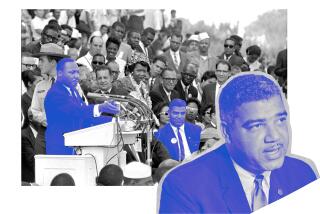‘The Long Walk Home’--Four Views : Movie Brings to Life a World of Bigotry in Montgomery Bus Boycott Era
- Share via
It was extremely disheartening to read the well-written but misguided review by Peter Rainer and commentary by Karl Fleming (Dec. 20) on the excellent new film “The Long Walk Home.”
Both writers objected to what they felt was misguided historical fact. Nowhere does this movie purport to be based on any specific incident or individual. Rather, it opts to fictionalize a story that brings to life the pool of unexhausted bigotry in Montgomery during the 1955 bus boycott.
Fleming actually seems so bitter that the story told in the film is not the one he personally recalls from his old journalism days at Newsweek that he is totally unable to grasp what a compelling drama this is to an audience without his individual experience. If critics wish to judge a movie based entirely on historical accuracy, they should in all fairness stick to reviewing documentary forms of filmmaking.
I did not feel that the whites in “The Long Walk Home” were candy-coated or sympathetic. They were portrayed as scared, narrow-minded and soulless. Even the character of Mrs. Thompson displayed all of these emotions and behaviors at times, and in the best of moments she was behaving as any decent human being should--nothing more. Rising above others’ prejudices does not create a hero, it simply shows an individual with understanding and compassion.
I hope that The Times’ articles do not turn people away from this film. Like most young Americans, I was reminded by “The Long Walk Home” of a time in our country’s history, shortly before I was born, that I am often negligent in thinking about.
It is clear to see that as 1991 begins, our laws have given minorities legal rights, but we as a nation are far from free in enjoying full human rights. This film is not only about 1955--but also about the present. It is a warm, yet strong, reminder about choices and about responsibility. That is something to be commended and rewarded and, hopefully, something we want to encourage others to participate in, not only in the make-believe world of film but in the reality of our daily existence.
More to Read
Only good movies
Get the Indie Focus newsletter, Mark Olsen's weekly guide to the world of cinema.
You may occasionally receive promotional content from the Los Angeles Times.










